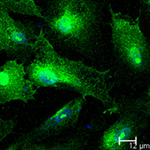Pleiotrophin expression and role in physiological angiogenesis in vivo: potential involvement of nucleolin
Main Article Content
Abstract
Background
Pleiotrophin (PTN) is a heparin-binding growth factor with significant role(s) in tumour growth and angiogenesis. Although implication of endogenous PTN has been studied in several in vivomodels of tumour angiogenesis, its role in physiological angiogenesis has not been addressed. In the present work, we studied expression and functional significance of endogenous PTN during angiogenesis in the chicken embryo chorioallantoic membrane (CAM).
Methods
Using molecular, cellular and biochemical assays, we studied the expression pattern of PTN in CAM and human endothelial cells and its possible interaction with nucleolin (NCL). CAM cells were transfected with a pCDNA3.1 vector, empty (PC) or containing full length cDNA for PTN in antisense orientation (AS-PTN). Angiogenesis was estimated by measuring total vessel length. In vitro, human endothelial cells migration was studied by using a transwell assay, and down-regulation of NCL was performed by using a proper siRNA.
Results
Endogenous PTN mRNA and protein levels, as well as protein levels of its receptor protein tyrosine phosphatase beta/zeta (RPTPβ/ζ) were maximal at early stages, when CAM angiogenesis is active. Application of AS-PTN onto CAM at days of active angiogenesis was not toxic to the tissue and led to dose-dependent decreased expression of endogenous PTN, ERK1/2 activity and angiogenesis. Interestingly, endogenous PTN was also immunolocalized at the endothelial cell nucleus, possibly through interaction with NCL, a protein that has a significant role in the nuclear translocation of many proteins. Down-regulation of NCL by siRNA in human endothelial cells significantly decreased nuclear PTN, verifying this hypothesis. Moreover, it led to abolishment of PTN-induced endothelial cell migration, suggesting, for the first time, that PTN-NCL interaction has a functional significance.Conclusions
Expression of endogenous PTN correlates with and seems to be involved in angiogenesis of the chicken embryo CAM. Our data suggest that NCL may have a role, increasing the number of growth factors whose angiogenic/tumorigenic activities are mediated by NCL.Article Details
How to Cite
KOUTSIOUMPA, Marina et al.
Pleiotrophin expression and role in physiological angiogenesis in vivo: potential involvement of nucleolin.
Vascular Cell, [S.l.], v. 4, n. 1, p. 4, mar. 2012.
ISSN 2045-824X.
Available at: <https://vascularcell.com/index.php/vc/article/view/10.1186-2045-824X-4-4>. Date accessed: 23 dec. 2025.
doi: http://dx.doi.org/10.1186/2045-824X-4-4.
Section
Original Research

